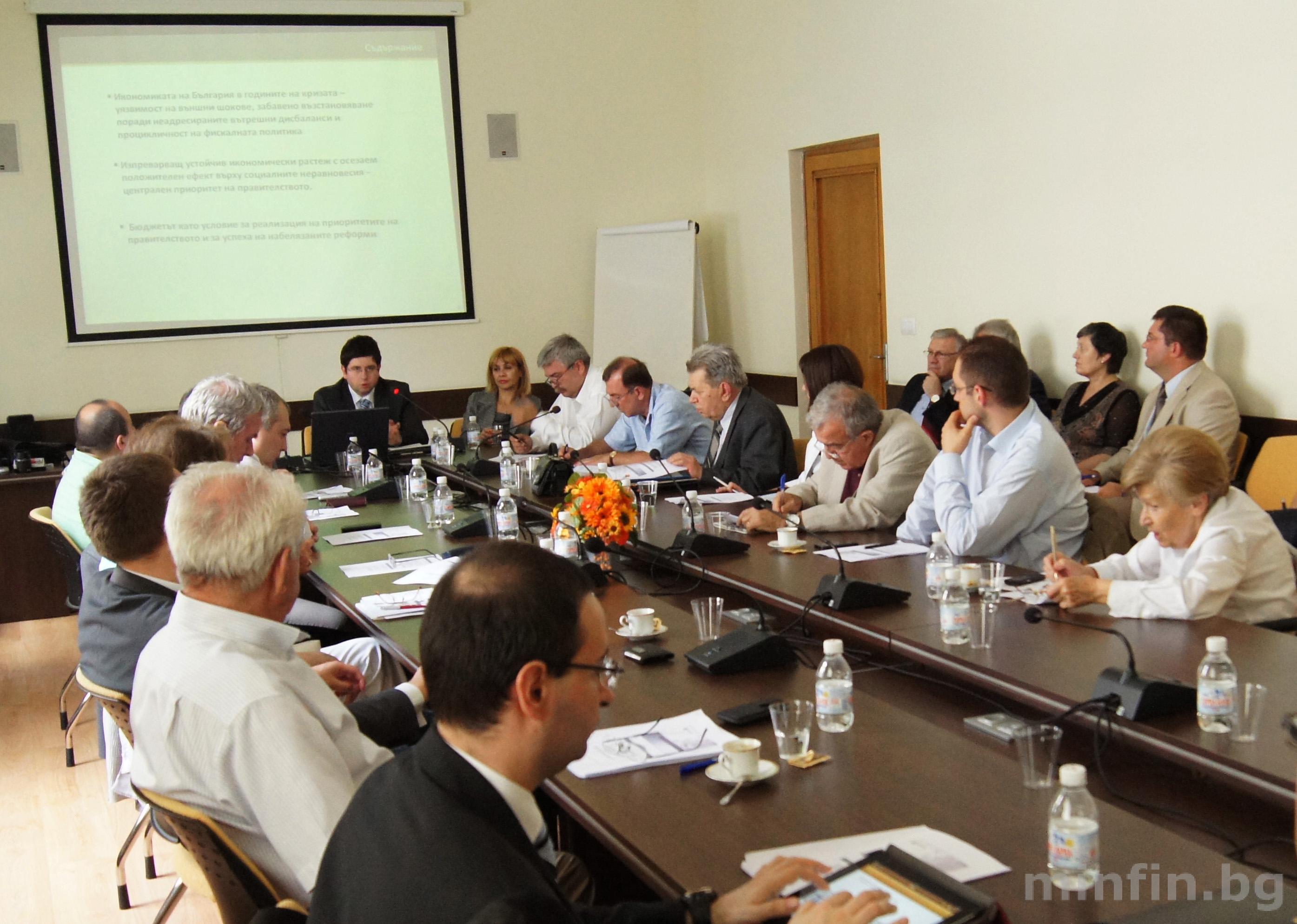PETAR CHOBANOV: THE FISCAL CONSOLIDATION POLICY IS NOT AN END IN ITSELF, BUT A FACTOR FOR ENSURING GROWTH AND EMPLOYMENT

11.07.2013
The adjustment of fiscal policy, while observing continuity regarding macroeconomic and fiscal stability, would allow more freedom to finance policies and sectors that generate growth, Minister of Finance Petar Chobanov said at a meeting with representatives of economic NGOs and of the academic organized at the Ministry of Finance. The topic of the meeting was "Priorities, Reforms and Their Realization through the Budget". He emphasized that the fiscal consolidation policy was not an end in itself, but a factor for ensuring growth and employment. In recent year we have a number of examples for a pro-cyclical policy that depresses growth. Chobanov acquainted the participants with data about the development of the Bulgarian economy in the last four years. The statistics show that in 2012 the gross domestic product (GDP) is by 2.6% lower than in 2008. Investments are also far from the pre-crisis levels and the total loss of employment for the period 2008-2012 is 543.4 thousand jobs or 14.2%.
Minister of Finance Petar Chobanov presented the short term priorities of the Government for stabilization of the economy. Among these are accelerated payment by the State under contracts completed and timely VAT refund. In addition a revision of administrative charges is foreseen as well as to implement the principle that they should cover only the costs for the service. The Government has started to implement a very active programme to lower the administrative burden on the businesses so that it would be easier and cheaper for them to pay their taxes and so that the State should not rely on administrative pressure. There are also problems with the introduced this year single tax and social security account. According to Chobanov it is a good project but its functioning does not allow the businesses to know what they have paid. The Finance Minister commented that a new e-service would be offered that would automatically inform companies when there were changes made to their tax account.
Regarding combatting contraband and the shadow economy, Chobanov stated that one of the methods was joint inspections as those made last week by the NRA, the Customs Agency and the Ministry of Agriculture and Food in respect of the fruit and vegetable markets. Another mechanism that will be implemented legislatively pertains to tackling actual VAT thefts in intra-Community supplies. Romania has a very good example in this regard and at the moment we are working towards the implementation of this example, Chobanov specified.
The economists from the NGOs and the academic were also acquainted with the reasons for the planned 2013 budget revision. The main objective is to put an end to the practice to accumulate arrears towards the businesses and to increase the non-refunded VAT which helps to reach the fiscal target but has a negative impact on economic activity. Among the reasons are the optimistic assumptions about economic growth. It has already been revised from 1.9% to 1%, which means that nominal GDP is by BGN 1.5 billion and consumption by around BGN 1 billion lower. The effects of legislative changes in regimes and deadlines for declaration and payment of some taxes that result in deferred revenues have not been taken into account. In addition there are no buffers in the budget. The Finance Minister reminded that only by the end of May, by Council of Ministers decrees expenditure to the amount of BGN 357 million had been approved of which BGN 209 million additional and not planned.
Minister Chobanov summarized that when the measures to improve the effectiveness of expenditure were combined with reforms to improve the business environment they would multiply the positive effect on the economy.
After the Minister's presentation the participants commented on the need to revise the budget and on the other topics referred to by Petar Chobanov. The opinions were contrary. According to some the 2013 budget could be implemented, while according to others the revision was natural and necessary because there were new policies to be implemented, as well as a new ministry which needed a budget. Some of the experts consider that it should be waited until the autumn to see the results of the measures introduced by the MoF to improve revenue collection.
Representatives of the Institute for Market Economics, the Economic Policy Institute, the BAS Economic Research Institute, the Bulgarian Association of Regional Development Agencies (BARDA), the Union of Accountants in Bulgaria, representatives of the academic - the Sofia University, the University of National and World Economy, the Union of Economists in Bulgaria, the Open Society Institute, the Institute for New Economic Progress and others took part in the discussion meeting.